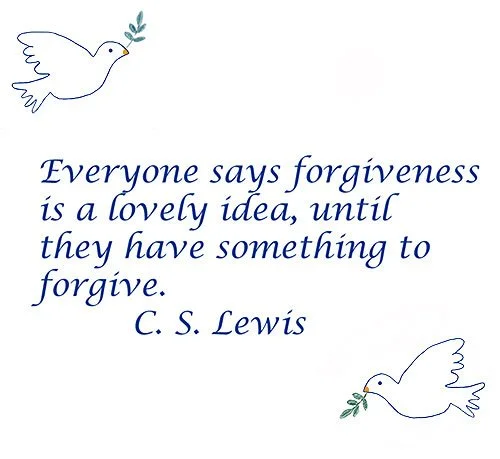So, Syria.
There is a well-known saying about how sometimes a week’s worth of things happen in the world in ten years, and sometimes ten years’ worth happens in a week. Guess which one is happening right now?
The theme of forgiveness has been coming up a lot in life, and listening to all the talking heads discuss Syria, something that struck me was how many of them focused on whether the rebels, flush with their success, would try to exact retribution. In fact, the rebels have surprised everyone by very explicitly saying they would not do so, which has led a lot of commentators - with varying degrees of subtlety - to admit that they don’t quite believe them.
It’s interesting, isn’t it, that in a situation like this, we assume that others will not forgive? Yes, of course there are cultural western biases here at work, about people in the Middle East, about Islam - but I think, even were this a South American or even European country, we might immediately wonder about vengeance.
And, in wondering aloud about vengeance, the unspoken message hanging in the air was that peace, true peace, can only happen without vengeance. The seeking of retribution - whether it be called justice, revenge, closure, whatever you like - seems associated with a return to violence. And yet, of course, seeing the scenes of the Sendaya prison and the emaciated half-corpses that dragged themselves into the sunlight for the first time in 15 years, there is part of any right-thinking person that turns their thoughts towards some sort of punishment.
Now, I am not nearly so wise as to even pretend to know what the right answers are here and, fortunately, that is up to the Syrian people (or, at least, it should be). But it did cause me to think about what forgiveness means in my own life. There’s a whole blog post coming someday about game theory and governance and the way that punishment and rehabilitation becomes part of that, but for the moment, I’ll just say that I think a good start is to take whatever vengeance or closure you think you want and just shave 15-20% off the top. Human beings, as a rule, overcorrect. And something I’ve noticed about vengeance, and closure, is that the desire for them often (but not always) fades. I’m not, by the way, saying that revenge and justice and closure are always bad. I’m not sure that’s true. But I will say that it’s in our nature to way overdo it.
So, while I hope for justice for the Syrian people, what I hope most for them is freedom and happiness. May they, and us all, achieve it, and soon.
